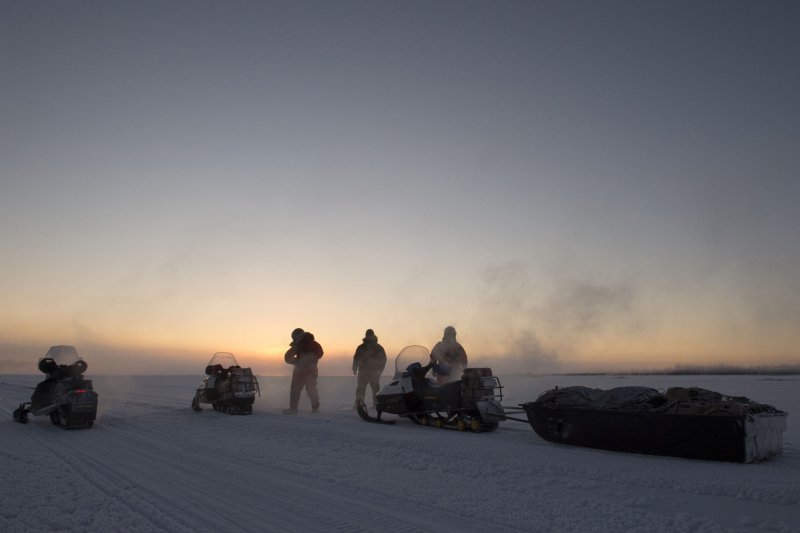A team including U.S. Marines pause to adjust their gear while traveling via snow machine across the Northwest Arctic Borough in Alaska last year. Photo by Alejandro Pena/U.S. Air Force/UPI |
License Photo
May 2 (UPI) -- Arctic nations, to their credit, have succeeded in working together to strike formal cooperative agreements for such things as oil spill management and maritime search and rescue. So far, however, very little work has been done to ensure that the region is protected against the potential impact of a nuclear disaster on the high seas.
As the amount of radioactive material in the Arctic increases over time, cooperative nuclear security represents a part of Arctic governance that will need to be addressed if the region, its people, the environment and the region's future economic potential are to be fully protected.
Today, the possibility of a nuclear disaster in Arctic waters stems from a variety of sources. The United States, Russia, Britain and France all deploy nuclear-powered submarines in the region, posing the risk of radioactive contamination in the event of a major accident. For example, in 1992 the USS Baton Rouge collided with a Russian submarine in the Murmansk region, and in 1993 another collision occurred involving the USS Grayling in the Barents Sea. Many Russian submarines have suffered from accidents, including: the sinking of the Kursk in 2000, which left 118 dead; 2003's sinking of K-159 while in tow to be decommissioned; and fires that broke out on the Yekaterinburg in 2011.
At the time, the Yekaterinburg was loaded with nuclear missiles as well as conventional torpedoes, and had the fire not been contained an explosion could have released large amounts of radiation into the atmosphere.
Aside from military assets, Russia also deploys a fleet of nuclear-powered icebreakers. As with submarines, numerous accidents have taken place aboard these vessels. Before its decommissioning, at least two accidents have been reported aboard the Soviet Union's first icebreaker, Lenin, resulting in the dumping of radioactive material at sea. More recently, fatal fires have occurred on these ships as well as problems with leaking reactor coolants. Experts from Green Cross Russia are fearful that more accidents have occurred and gone unreported.
An additional source of potential contamination comes from Russia's planned use of floating nuclear power plants in Arctic waters. These are intended to provide power to remote communities and promote economic development, such as offshore energy and mineral extraction. The first facility is expected to be operational between 2019 and 2021, prompting concern over the safety of such power plants. Furthermore, Russia has in the past proven to be an unreliable actor in properly disposing of its nuclear material or preventing accidents to its active reactors, often opting to simply dump radioactive material at sea or allow it to languish in inadequate storage facilities.
Greater international cooperation will be required to address seaborne nuclear threats. Previous efforts aimed at mitigating the threat of nuclear contamination in the Arctic region have thus far been conducted primarily through bilateral negotiations. These include initiatives like the U.S.-led Cooperative Threat Reduction program, which focused on the removal of nuclear weapons and the decommissioning of nuclear submarines.
Progress toward this end might be achieved through the use of the Arctic Council as a forum to negotiate international accords on increased cooperation and coordination of nuclear disaster response. As Svein Rottem, a senior research fellow at Norway's Fridtjof Nansen Institute, recently noted, the significance, role and influence of the Arctic Council is growing. This is particularly true in the case of the five littoral Arctic states of Canada, Denmark, Norway, Russia and the United States, which are most enthusiastic about expanding the council and giving the organization a greater role in international affairs. Fortunately for the topic of nuclear security, this group also includes the region's two nuclear powers – as well as Norway, which has been particularly active in past efforts concerning nuclear security and safety.
Using previously negotiated agreements as a template, namely 2011's Arctic Search and Rescue Agreement and 2013's Agreement on Cooperation on Marine Oil Pollution, Preparedness and Response in the Arctic, modest progress might be made in protecting the region from the impacts of a nuclear disaster at sea. This might include the clear delineation of zones of responsibility in the event of a nuclear incident, general information sharing, an international safety and inspection regime to ensure compliance, cooperative training exercises and agreements regarding international access to facilities such as airfields, ports, supply and medical facilities.
As climate change opens up new shipping routes and opportunities for economic development, the likelihood and impact of a nuclear disaster in the Arctic will grow. As such, improved international cooperation, referral and reliance on international agreements will likely become increasingly necessary so states can react to and manage this growing threat. Barring a return to the overt hostilities that preceded the end of the Cold War, it is likely that international relations in the Arctic increasingly fall within the domain of the region's growing number of cooperative institutions.
However, as with all political efforts, greater cooperation will depend on the will of participatory states and their citizens, who are likely to act only when it is deemed to be in their best interests to do so. While currently at odds, the U.S. and Russia do share a variety of concerns related to nuclear security and a history of cooperation regarding mutual security interests. These include cooperation on nuclear non-proliferation, the prevention of nuclear terrorism and the protection of the Arctic environment, all topics that would benefit from a formalized and inclusive nuclear security regime.
Derek Ritsma is a recent graduate of the master's program in political science at York University. This article originally appeared on Arctic Deeply, and you can find the original here. For important news about Arctic geopolitics, economy, and ecology, you can sign up to the Arctic Deeply email list.















